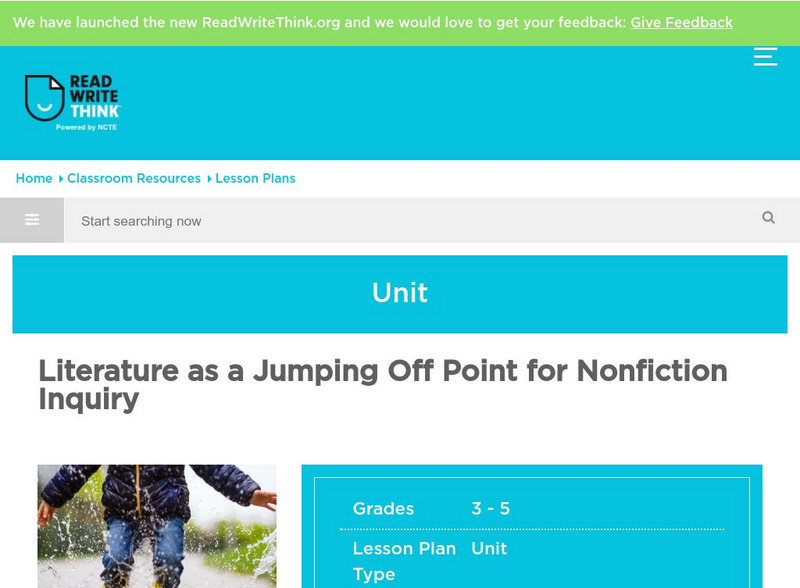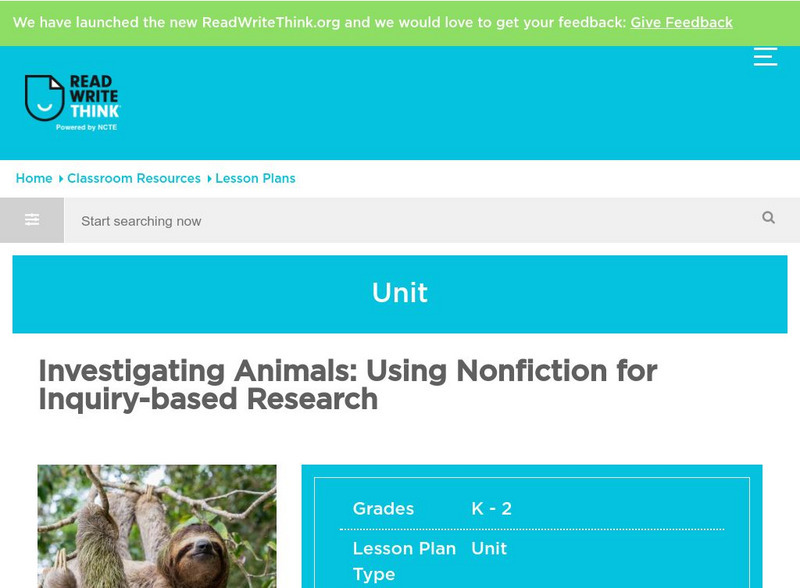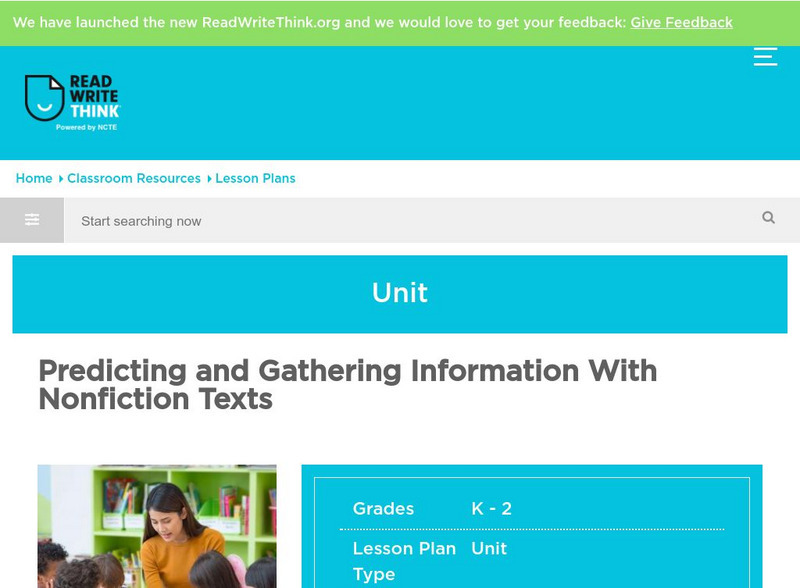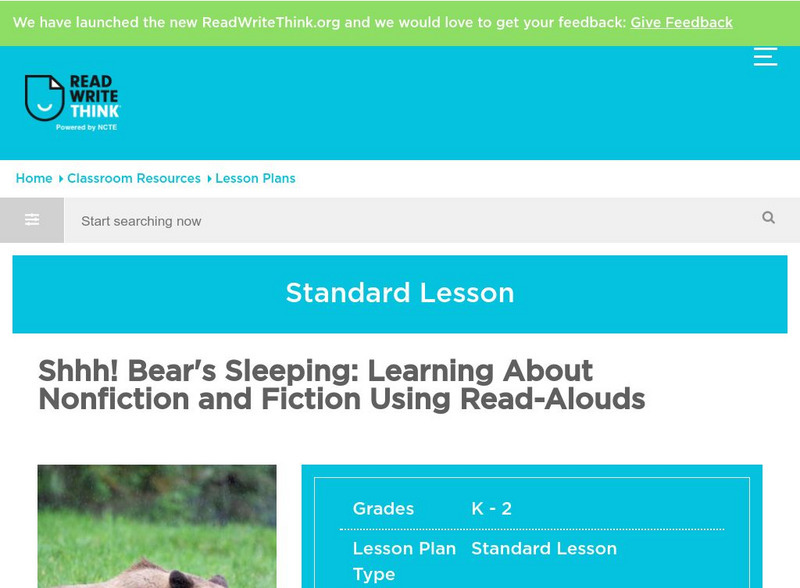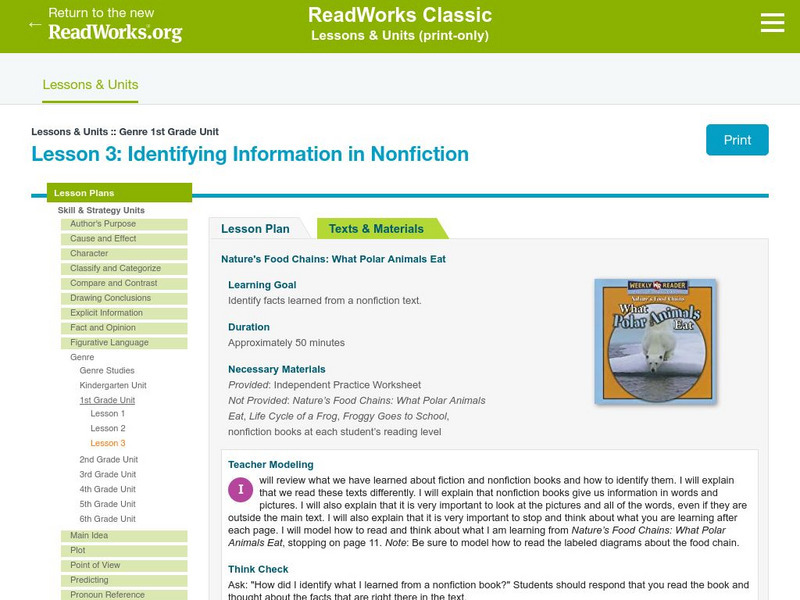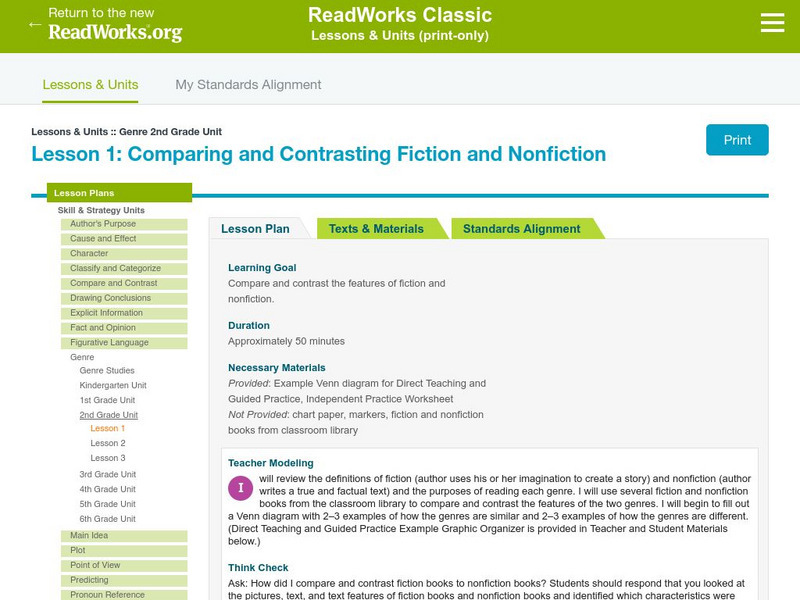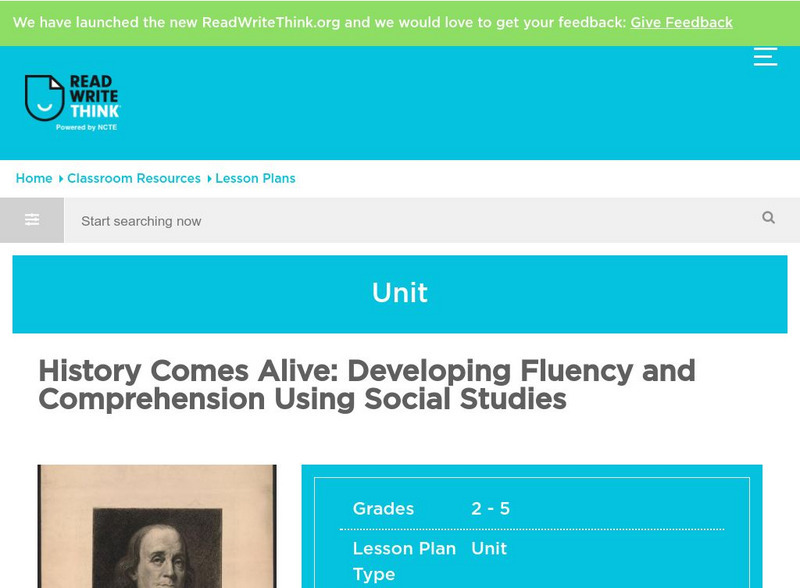Scholastic
Scholastic: Lesson Plan for Nonfiction Comprehension: Skimming Text
Build comprehension by developing reading strategies for use with nonfiction text. This lesson focuses on teaching students to recognize text elements as clues to help them quickly locate key information in text.
Better Lesson
Better Lesson: It's a Process. Day 1 of 5
SWBAT collaborate in writing step by step directions for writing an informational paragraph.
Utah Education Network
Uen: Setting a Purpose for Reading Using Informational Text
This lesson engages students in using a two-column graphic organizer to take notes. Students will record titles and subtitles and list questions that will correspond with each one.
Other
Corwin Press: Chapter 7: Informational Text Lessons in First Grade
This chapter provides guided informational text lessons for first graders. Differentiation and management tips are provided, along with steps to use while implementing these lessons.
Other
Seeing the World in Print Through Nonfiction
Unit plan containing five lessons designed for tenth graders. They center around reading and writing nonfiction, and they teach skills such as identifying the features of nonfiction and writing expository texts. All are aligned to...
Florida Center for Reading Research
Florida Center for Reading Research: Fiction and Nonfiction Sort [Pdf]
A lesson plan in which young scholars look at different books, write their titles, and sort them according to whether they are fiction or nonfiction. Materials are included.
Florida Center for Reading Research
Florida Center for Reading Research: Exp. Text Structure: Projected Paragraphs
A lesson plan in which students read a text and highlight the most important details. Materials are included. [PDF]
ReadWriteThink
Read Write Think: Comparing Fiction and Nonfiction With Little Red Riding Hood
Contains plans for nine 50-minute lessons that center around different versions of "Little Red Riding Hood." In addition to objectives and standards, this instructional plan contains links to PDF handouts and sites used in the lessons as...
Texas Education Agency
Texas Gateway: Irony, Sarcasm, and Paradox (English Ii Reading)
[Accessible by TX Educators. Free Registration/Login Required] In this lesson, you will learn to evaluate the role of irony, paradox, and sarcasm in literary nonfiction such as speeches and essays. It includes the definitions and...
ReadWriteThink
Read Write Think: Comprehending Nonfiction Text on the Web
Contains plans for three lessons designed to improve comprehension of nonfiction, especially nonfiction texts on the web. It focuses on identifying text features, locating specific information, and generalizing that information. In...
ReadWriteThink
Read Write Think: Literature in Nonfiction Inquiry
This lesson plan involves students working in groups after reading a work of literature to develop text sets. Included in the lesson plan is an overview, practice, objectives, resources, preparation, and more.
ReadWriteThink
Read Write Think: Using Nonfiction for Inquiry Based Research
Contains plans for lessons that help students explore the nonfiction genre by doing inquiry-based research on animals. In addition to objectives and standards, this instructional plan contains links to sites used in the lessons as well...
ReadWriteThink
Read Write Think: Reading/writing About Whales Using Fiction and Nonfiction Texts
Students will have a whale of a good time in this lesson in which they use fiction and nonfiction texts to write a letter to an online scientist.
ReadWriteThink
Read Write Think: Predicting and Gathering Information With Nonfiction Texts
Contains plans for eight short lessons that introduce nonfiction texts to second grade students. In addition to objectives and standards, this instructional plan contains links to sites used in the lessons as well as assessment and...
ReadWriteThink
Read Write Think: Shhh! Bear's Sleeping: Learning About Nonfiction and Fiction
Students explore the distinction between the fiction story Bear Snores On and the nonfiction book Every Autumn Comes the Bear.
Read Works
Read Works: Genre 1st Grade Unit: Identifying Information in Nonfiction
[Free Registration/Login Required] A lesson in which students use the books Nature's Food Chains: What Polar Animals Eat by Joanne Mattern, Life Cycle of a Frog by Angela Royston, and Froggy Goes to School by Jonathan London to learn to...
Read Works
Read Works: 2nd Grade Lesson: Compare/contrast Genres
[Free Registration/Login Required] A lesson in which students use fiction and nonfiction books from a classroom library to identify the similarities and differences between fiction and nonfiction and to create a Venn diagram...
Read Works
Read Works: 1st Grade Lesson: Classifying Texts
[Free Registration/Login Required] A lesson in which students use the books Froggy Goes to School by Jonathan London and Life Cycle of a Frog by Angela Royston to learn to classify texts as fiction or nonfiction. Lesson includes direct...
E Reading Worksheets
E Reading Worksheets: Summarizing Worksheets and Activities
In this instructional resource, students will learn more about summarizing texts. Worksheets and PowerPoint lessons are provided to reinforce understanding about ways to summarize nonfiction texts and to identify main ideas. This module...
ReadWriteThink
Read Write Think: Question and Answer Books From Genre Study to Report Writing
Contains plans for eight lessons that explore Question and Answer Books and ask young scholars to do research in order to write their own. In addition to objectives and standards, these instructional plans contain links to sites used in...
Other
Literature Circles: Lesson Plans and More
What are the major roles in literature circles? Check out this site to learn more about the individual roles needed to form a literature circle. Includes links to various reading handouts and lessons.
ReadWriteThink
Read Write Think: Using Comprehension Strategies With Elie Wiesel's Night
Working in small groups, young scholars read and discuss Elie Wiesel's memoir Night and then take turns assuming the "teacher" role, as the class works with four different comprehension strategies.RI.11-12.4 Word meaning, RI.11-12.10b...
ReadWriteThink
Read Write Think: History Comes Alive: Developing Fluency and Comprehension
Let the power of imagination and inference serve as a "time machine" to bring Benjamin Franklin into the classroom! History and science come to life in a dialogue with Franklin the inventor, developed through lesson activities that...
Polk Brothers Foundation Center for Urban Education at DePaul University
De Paul University: Center for Urban Education: Nutrition Lesson [Pdf]
"Nutrition Lesson" is a one page, nonfiction passage about protein including what it does in the body and what foods contain protein. It is followed by questions which require students to provide evidence from the story; it includes...


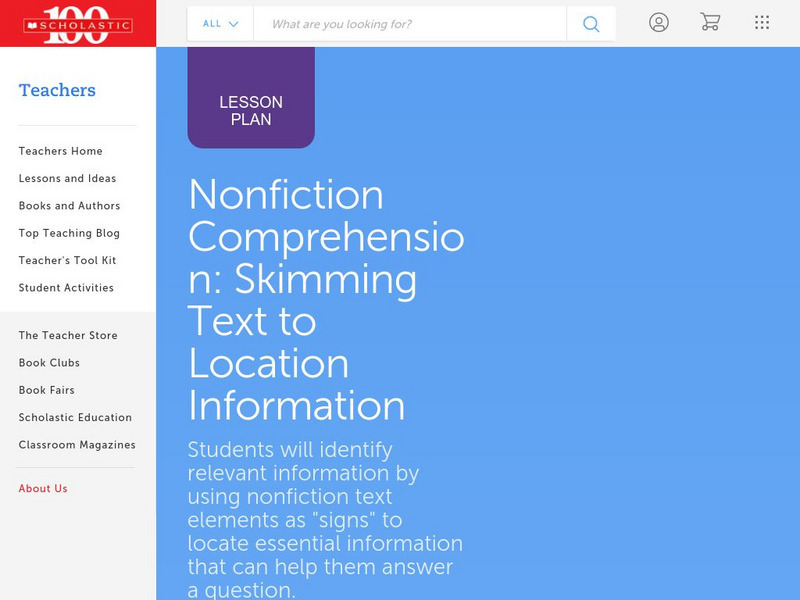



![Florida Center for Reading Research: Fiction and Nonfiction Sort [Pdf] Lesson Plan Florida Center for Reading Research: Fiction and Nonfiction Sort [Pdf] Lesson Plan](https://content.lessonplanet.com/knovation/original/509105-4469283d2301f2d80ae09183a55b8e2c.jpg?1661786967)




